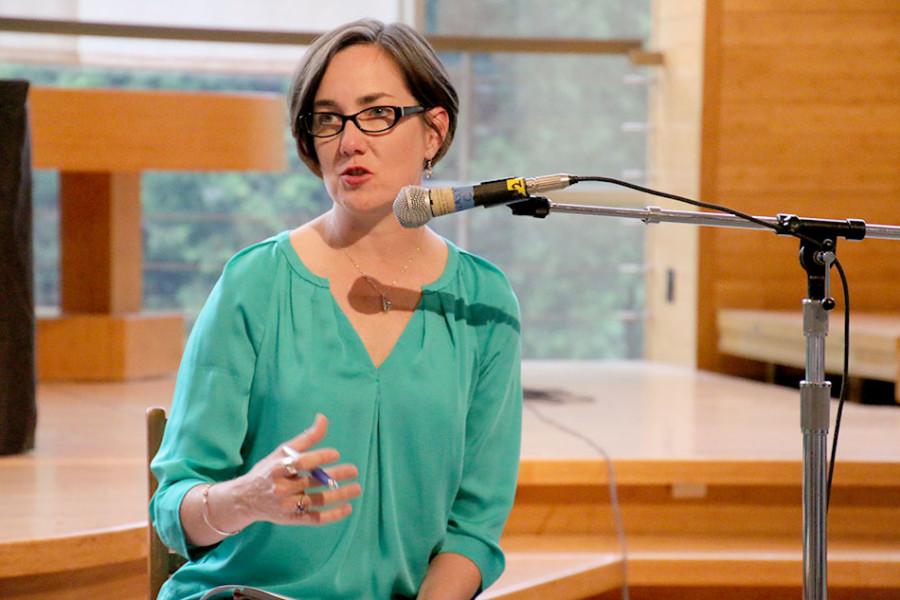State reps discuss progress, problems with criminal justice reform efforts
Drew Gerber/The Daily Northwestern
Rep. Kelly Cassidy (D-Chicago) answers a community member’s question during a Q&A session. Cassidy and Rep. Robyn Gabel (D-Evanston) held a town hall meeting Wednesday evening to discuss recent issues and legislation surrounding criminal justice reform.
June 18, 2015
Two Democratic state representatives gave legislative updates on criminal justice reform efforts at a town hall meeting in Evanston on Wednesday evening, aiming to foster discussion on the progress that’s been made as well as areas for improvement.
Rep. Robyn Gabel (D-Evanston) and Rep. Kelly Cassidy (D-Chicago) spoke to about 40 people at the Unitarian Church of Evanston, 1330 Ridge Ave., about recent legislative successes in reforming the criminal justice system in Illinois. Cassidy, who helped develop and now chairs the Juvenile Justice & System-Involved Youth committee, spoke about positive trends that will lead to reform, such as growing bipartisan support.
“We talk a lot … about what an unproductive session this has been,” Cassidy said. “But in the area of criminal justice reform, in particular around juvenile justice issues, it has been incredibly productive.”
Recent progress includes the elimination of juvenile life sentences without parole and a bill standardizing cannabis ordinances within the state that is awaiting Gov. Bruce Rauner’s signature.
The elimination of life sentences without parole for juveniles — along with a complementary bill that allows juveniles to petition for resentencing during their incarceration — stems from the 2011 Supreme Court ruling in Miller v. Alabama that such sentences are unconstitutional, Cassidy said. The Supreme Court did not rule whether its reasoning applied retroactively, however, which she said creates a sense of unfairness.
“The fact that a juvenile was sentenced the day before the Supreme Court ruling rather than the day after should not force one child to remain in prison for life while another child gets a resentencing hearing,” she said.
Cassidy is the chief sponsor of a House bill that sets statewide standards mandating ticket citations and fines for the possession of drug paraphernalia or any amount of cannabis under 30 grams, instead of a misdemeanor charge. Cassidy said the driving force behind the bill was a desire to keep people out of the criminal justice system for low-level drug offenses but that it also sought to eliminate prejudicial arrests.
“What we found, with over 100 ordinances in the state allowing for tickets, what mattered in whether you got ticketed or arrested was where you lived and what you looked like,” Cassidy said.
Gabel and Cassidy acknowledged that there are many areas that still need reform, such as issues with expunging juvenile records and mandatory sentencing.
“Getting rid of mandatory sentencing is something that we’re working on,” Gabel said. “Even good judges can’t make decisions about which juveniles should go to adult court and which should go to juvenile court.”
Both representatives said they disagree with aspects of Rauner’s stance on criminal justice reform, but they believe reform is generally an area where they can find common ground. Rauner created the Illinois State Commission on Criminal Justice and Sentencing Reform by executive order. The commission aims to decrease the state prison population by 25 percent over the next 10 years, a goal that Gabel and Cassidy both said encouraged them.
The town hall meeting was attended by several professionals and experts on the issue of criminal justice reform who jumped in to help provide answers and additional information during the representatives’ Q&A session.
Evanston resident and community activist Albert Gibbs, however, said the meeting left something to be desired. Gibbs, who told The Daily he focuses mostly on community issues such as gang violence in Evanston’s 5th Ward, spoke personally about the effect of the criminal justice system on black youth in that ward and his own experience with drug addiction.
Gibbs said he believes conversations like these need to be more direct and address underlying issues like race, rather than “educated” discussions where he feels people “talk over and around each other to sound the smartest.”
“The only way to get to the bottom of these issues is to be honest,” he said.
Email: drewgerber2018@u.northwestern.edu
Twitter: @dagerber



